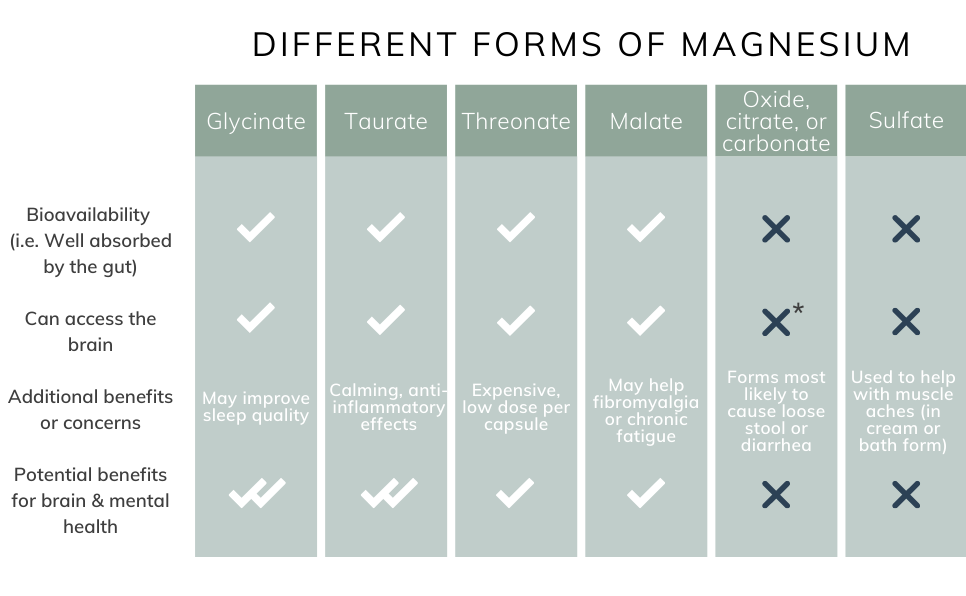Types of Magnesium: A Comprehensive Guide
Introduction
Magnesium is an essential mineral that plays a key role in many bodily functions, including muscle and nerve function, heart health, and bone formation. It is found in various food sources and can also be taken as a dietary supplement. But with so many forms of magnesium available, it can be difficult to know which one is right for you. In this article, we’ll explore the different types of magnesium and their unique benefits.
Benefits Of Magnesium
Magnesium is an essential mineral that offers numerous health benefits. Some of these benefits include:
- Regulating heart function: Magnesium plays a crucial role in maintaining normal heart rhythm and blood pressure.
- Supporting muscle and nerve function: Magnesium is involved in muscle contractions and nerve transmission, and is necessary for muscle relaxation.
- Maintaining strong bones: Magnesium is essential for the development and maintenance of strong bones, as it helps to regulate the metabolism of calcium and vitamin D.
- Reducing stress and anxiety: Magnesium has a calming effect on the body and can help reduce symptoms of stress and anxiety.
- Improving sleep: Magnesium is known to promote restful sleep and can help those with insomnia.
- Regulating blood sugar levels: Magnesium is involved in the metabolism of glucose and insulin, and can help regulate blood sugar levels.
- Promoting healthy digestion: Magnesium helps regulate digestive processes, including bowel movements, and can relieve symptoms of constipation.
These are just a few of the many benefits of magnesium, and it is important to ensure that you get enough of this essential mineral in your diet to reap its benefits.
Popular Types Of Magnesium
1. Magnesium Oxide
Magnesium oxide is the most commonly used form of magnesium in dietary supplements. It has a high concentration of magnesium (about 60%) but is not easily absorbed by the body. This form of magnesium is often used as a laxative and to treat heartburn and indigestion.
2. Magnesium Citrate
Magnesium citrate is a form of magnesium that is combined with citric acid. This form of magnesium is well absorbed by the body and is often used as a laxative and to treat constipation. It is also used to prevent and treat magnesium deficiencies.
3. Magnesium Chloride
Magnesium chloride is a form of magnesium that is combined with chloride. This form of magnesium is easily absorbed by the body and is often used for transdermal (skin) applications, such as magnesium baths and magnesium oil sprays. Magnesium chloride is also used to support heart health and to improve athletic performance.
4. Magnesium Glycinate
Magnesium glycinate is a form of magnesium that is combined with glycine. This form of magnesium is well absorbed by the body and is often used to improve sleep, reduce anxiety, and alleviate muscle pain and cramping. Magnesium glycinate is also used to prevent and treat magnesium deficiencies.
5. Magnesium L-Threonate
Magnesium L-threonate is a form of magnesium that is combined with L-threonic acid. This form of magnesium is easily absorbed by the body and is often used to improve brain function and memory. It is also used to prevent and treat magnesium deficiencies.
Who Should Take A Magnesium Supplement?
Magnesium supplements can be beneficial for a variety of individuals, including:
- People with magnesium deficiency: Magnesium deficiency is relatively common and can cause symptoms such as muscle cramps, fatigue, and headaches. Taking a magnesium supplement can help alleviate these symptoms.
- Individuals with chronic conditions: People with chronic conditions such as type 2 diabetes, heart disease, and osteoporosis may benefit from taking magnesium supplements, as magnesium can help regulate glucose levels, maintain heart health, and promote bone health.
- Athletes and physically active individuals: Magnesium plays an important role in muscle function and is important for post-exercise recovery. Athletes and physically active individuals may therefore benefit from taking magnesium supplements.
- Women with menstrual discomfort: Magnesium can help alleviate menstrual cramps and other symptoms associated with menstrual discomfort.
- Older adults: As we age, magnesium levels in the body can decrease, making it important for older adults to ensure they are getting enough magnesium through their diet or supplements.
However, it is important to speak with your doctor before starting a magnesium supplement, as taking too much magnesium can cause adverse effects. Your doctor can help determine if a magnesium supplement is right for you, and can recommend the appropriate dose.
Conclusion
When choosing a magnesium supplement, it’s important to consider your specific health needs and to talk to your healthcare provider. The type of magnesium you choose can impact the effectiveness of the supplement and its potential side effects. By understanding the different types of magnesium, you can make an informed decision and ensure that you are getting the best form of magnesium for your health.
Reference: Medical News Today









